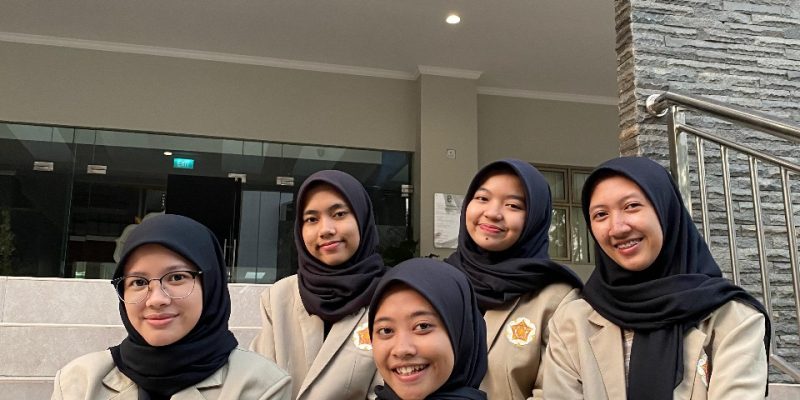A team of Biology students at Gadjah Mada University (S1) made another achievement at the national level by winning first place in the National Essay Competition, led by Ghefira Nur Fatimah along with Jauza Hanifah Azzahra, Meinawa Amaliah, Fadilla Nur Hidayat, and Nimas Ayu Pramesthi. This national-level essay competition was organized by Brawijaya University from June 1st to September 13th, 2023, with the theme “Collaborative Nation-Building through Applied Technology Innovation towards Self-Reliant Indonesia,” . This event encompassed various stages, including the submission of works, assessment, finalist announcement, video presentation submission, video presentation assessment, and winner announcement.
The team took the subtheme Food and Agriculture Processing Technology, with their work titled “Organic Capsule Fertilizer Made from Household Organic Waste as a Manifestation of Circular Economy and Environmental Conservation.” Their scientific work was motivated by the escalating issue of waste accumulation in Indonesia, a country that generates approximately 21.2 tons of waste per year, predominantly consisting of household waste such as food waste, dry leaves, wood, tree branches, and food industry waste. Among the household waste types employed by Ghefira and her team was the mangrove crab shell waste (Scylla serrata). The mangrove crab’s body is primarily composed of its shell, accounting for about 80% of its weight, with the remaining 20% being edible flesh. They selected the mangrove crab shell due to its biocompatible, biodegradable, low toxicity, easy synthesis, and safe application properties.
In their innovation, Ghefira and team implemented two technologies: vermicomposting and microwave technology. This combination transformed organic waste into an innovative product: water-soluble organic capsule fertilizer. The organic fertilizer was crafted from household organic waste, while the water-soluble capsule shell was created from mangrove crab shells. The vermicomposting technology was utilized in the production of organic fertilizer involving the use of earthworms, specifically Eisenia foetida and Eisenia Eugeniae, in composting organic matter. The end result of vermicomposting technology is vermicompost, a mixture of worm castings and compost.
The microwave technology was used in producing water-soluble capsule shells using mangrove crab shell material. Chitin compounds found in mangrove crab shells can be transformed into chitosan for capsule shell production. The chitosan from mangrove crab shells has a large molecular weight, necessitating the application of microwave technology to produce chitosan with high deacetylation degree and low molecular weight, ensuring high solubility in water. The process for making chitosan capsule shells involves several sequential steps, including sample preparation, chitin isolation (deproteinization, demineralization, and decolorization processes), chitosan synthesis (repeated deacetylation using microwave), production of Glucosamine Hydrochloride (GLcN HCl) (via hydrolysis and centrifugation processes), and finally, capsule shell formation using modified capsule molds.
Through these two technologies, they produced water-soluble organic capsule fertilizer with numerous advantages. The use of fertilizers that previously required mixing various components may now be simplified through the capsule form, making application on plants more convenient. Individuals need not worry about measuring fertilizer quantities, as the organic capsule fertilizer already contains all necessary elements for plants in a complete and precise manner. Additionally, the capsule form facilitates storage due to its relatively small size, saving storage space. The water solubility of the organic capsule fertilizer is relatively fast, preventing residual waste during use. Therefore, the organic capsule fertilizer implements a circular economy system and is anticipated to contribute to environmental conservation.


